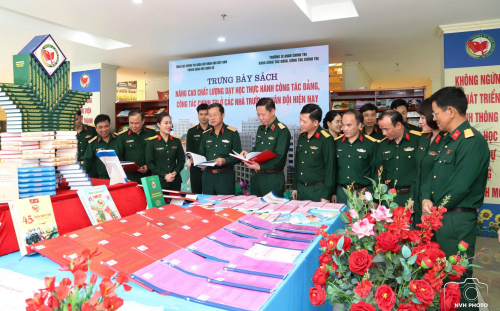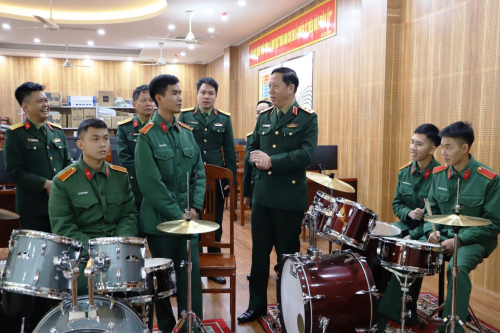Political Officer College thoroughly grasps and implements Directive No. 2423-CT/QUTW
On 9th November 2023, the Central Military Commission (CMC) Standing Board promulgated Directive No. 2423-CT/QUTW on “Renovating and enhancing the quality of political education in the new period”. As the centre for training political cadres at battalion level, the Party Committee and Board of Directors of the Political Officer College (hereafter the School) have focused on leading and directing the implementation of this Directive seriously, effectively through many synchronous and appropriate solutions.
Immediately after the issuance of Directive No. 2423-CT/QUTW by the CMC Standing Board, the School’s Party Committee thoroughly grasped and profoundly disseminated the Directive’s goals, requirements, tasks, and solutions. Simultaneously, they identified the key contents and measures that need the focused leadership and direction during the implementation process. The imperatives of “strengthening leadership, raising awareness, innovating thinking and methods of the all-level Party committees and organisations regarding political education, fundamentally, comprehensively renovating the content, curriculum, forms, and methods of political education, improving the quality and responsibility of cadres engaged in political education associated with the exemplary role of party members, lecturers, especially the key ones at all levels, resolutely overcoming shortcomings, creating substantial changes in the quality of political education” as mentioned in the Directive have been identified by the School as focal tasks. The effective performance of these tasks is of significant importance, creating a dynamic practical environment for training and enhancing political willpower and skills in conducting party, political work and political education for cadres, lecturers, especially for cadets - the key political officers at battalion level in charge of political education for their troops upon graduation. To achieve these objectives, the School’s Party Committee and the Board of Directors have been focusing on leading and directing the implementation of several basic solutions in a synchronised manner as follows.
 |
| Supplementing books and documents to renew political education |
First, continuing to raise awareness and encourage actions of cadres, lecturers, cadets, defence workers, and soldiers about the position, importance, and urgent requirements of improving the quality of political education. Political education is an important part of cultural and ideological work, a fundamental aspect of party and political work in the Army. It plays a decisive role in building a politically strong Vietnam Peoples’ Army, serving as a foundation for enhancing the overall quality and combat strength of the entire Army. For the School, well performing political education work not only contributes to building the contingent of cadres, party members, lecturers, cadets, defence workers and soldiers with great political determination, absolute loyalty to the Party, the Homeland, and the People, but also helps improve the quality of political officer training, enabling cadets to grasp the content, requirements, methods, and organisational forms of this work to successfully fulfil their duties after graduation. Therefore, the School’s Party Committee and Board of Directors have actively organised in-depth and comprehensive implementation for cadres, lecturers, students, defence workers, and soldiers to fully understand the requirements and content of Directive No. 2423-CT/QUTW of the CMC and higher echelons’ resolutions, directives, and guidelines regarding political education. Grounded on those documents, party committees and commanders of agencies, faculties, and units, especially party secretaries, political commissars, and political cadres at all levels should clearly define their responsibilities for political education, while considering it a regular task and a vital aspect in building pure, strong party organisations and “exemplarily, typically” comprehensively strong faculties, offices, and units.
Second, strengthening the leadership and guidance of party committees and commands of agencies, faculties, and units. This is a paramount solution that determines the quality and effectiveness of political education within each agency and unit, especially when the School and the entire Army are subject to multifaceted impacts from the negative aspects of society and the fierce opposition of hostile forces. Therefore, party committees at all levels should issue specialised resolutions, plans, and instructions in accordance with their task requirements. In their resolutions, both advantages and challenges should be clearly assessed, along with the existing conditions, causes, specific directions, and measures. Special attention should be paid to strengthening leadership and innovation and harnessing the comprehensive strength of organisations and forces to improve the quality of political education. In the implementation process, political agencies need to effectively play their advisory role, take the lead, and closely cooperate with other agencies, faculties, and units, especially in developing programs and plans to ensure that political education work will be carried out in a disciplined and substantial manner. Emphasis should be placed on effectively linking political education with military training, regularity building, and discipline management, closely combining political education with legal education and social sciences and humanities education in order to protect the ideological foundation of the Party and combat wrong views. The results of political education should be seen as one of the important criteria for evaluating the task performance of party committees, party organisations, commands, party members, lecturers, and cadets, especially the key cadres at all levels.
Third, extensively, comprehensively renovating the content, program, forms, and methods of political education. As the training centre for political officers at battalion level, the School has always prioritised reviewing, adjusting, and developing its Social Sciences and Humanities program for groups of learners under Resolution No. 1657-NQ/QUTW dated 20th December 2022, by CMC on “Renovating education and training to meet the requirements of Army building in the new situation”. Simultaneously, there has been a focus on renewing the program, content, forms, and methods of political education for groups of learners, especially renewing the forms of political study and thematic research for officers. The School has emphasised the active, creative engagement of learners, considering them as the centre of the learning process. It has also valued the application of information technology in political education and maintained established practices, while introducing innovations to enhance the quality of political education and providing opportune information and public opinion guidance to foster collective understanding and consensus among its cadres, lecturers, cadets, and defence workers. Due regard has been paid to innovating the content, forms, and methods of teaching topics of Political Education at company level and Organising political teaching at company level towards increasing practice time. This includes harnessing the positive and creative traits of cadets, combining equipping knowledge, training political willpower, working methods with developing professional skills, teaching skills, and using information technology in management and organisation of political education within the unit. Diversification and scientific organisation of teaching forms have been encouraged, with a particular focus on practical teaching and the organisation of extracurricular activities to maximise the roles of lecturers and student management personnel in fostering skills and competence in party and political work for cadets. Efforts have been made to promote innovative models and practices that had been implemented in a comprehensive and effective manner, and organise Achievement-reporting Ceremonies to President Ho Chi Minh for graduating cadets and those who have completed Phase 1 of their training process, as well as field trips for historical and traditional education.
 |
| Improving cadets’ necessary skills |
Fourth, enhancing the quality of the personnel directly involved in political education. This is an important and practical solution that brings motivation and promotes innovation and creativity in the School’s political education. Therefore, alongside the efforts to build and improve the quality of lecturers and educational management cadres, the School has also focused on enhancing the quality of the personnel directly responsible for carrying out political education, building a contingent of political commissars and cadres in charge of party and political work with good moral qualities, exemplary behaviour, and comprehensive capabilities to meet the requirements of political education in the new period. To achieve this goal, the School continues to step up studying and following Ho Chi Minh’s thought, morality, and lifestyle, actively participate in the Movement of Promoting tradition, devoting talent, deserving to be “Uncle Ho’s Soldiers” in the new era. This is closely associated with the execution of Resolution of the 13th Party Central Committee’s 4th Plenum on building and rectifying the Party and political system, as well as Resolution No.847-NQ/QUTW of the CMC on promoting the virtues of “Uncle Ho’s Soldiers” and resolutely combating individualism in the new situation. Thereby, a favourable environment has been created for educational management cadres and lecturers to continuously perfect themselves in character, moral qualities, dedication, and responsibility for their tasks. At the same time, the School has regularly maintained the operation of the Political Teaching Group, organised training courses, seminars, and teaching competitions, and proposes opportunities for further training and practical experience.
Fifth, managing strictly and using financial resources and facilities for the intended purposes, seriously implementing the work of inspection, preliminary and final reviews. The School has directed the strict management and effective use of its budget, ensuring adequate provision of equipment and materials for political education work in accordance with Circular No. 138/2020/TT-BQP dated 10th November 2020 by the Ministry of National Defence on “Regulations on the regimes, norms, and standards of cultural and spiritual life in the Vietnam People’s Army”. Along with higher echelon’s supply, the School has focused on preserving, exploiting, and effectively using its available facilities, investing in computer systems for political education through the Local Area Network, projectors for political lectures, utilising the effectiveness of the panel system, electronic boards, internal broadcasting, etc., to serve political education. Additionally, strengthening inspection, review, and assessment of political education results is crucial to ensure objectivity and effectiveness. The inspection of political education work is closely linked to the inspection of party, political work and social sciences and humanities. There has been an emphasis on renovating and diversifying inspection forms, implementing a unified management system at each level in accordance with the Regulations on Political Education in the Vietnam People’s Army and Vietnam Militia and Self-Defence Force. The School regularly conducts effective preliminary and final reviews to draw lessons, carries out commendation work, and replicates good models, creative and effective methods, etc. Thereby, these efforts have contributed to improving the quality and effectiveness of political education, perfecting individuals, and developing organisations so as to cultivate revolutionary ideals and goals for cadres, lecturers, defence workers, and soldiers, especially for the cadets of the School - the future political officers of the Army and make them always “both red and expert”, ready to receive and excellently accomplish all assigned tasks”.
Lt. Gen. NGUYEN QUOC TUAN
Political Commissar of the School